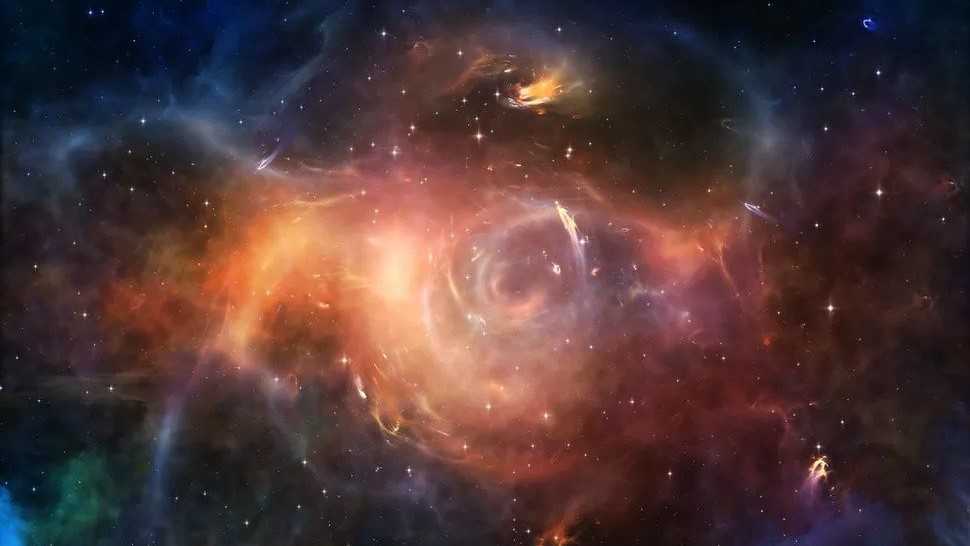Oldest radio-wave explosion ever found could be used to weigh the universe, astronomers say
Astronomers traced a mysterious radio source to three merging galaxies 8 billion light-years away. Studying it could help uncover the universe's missing matter.

Astronomers have discovered the most ancient "heartbeat" radio signal, and they want to use it to find the missing half of the universe's matter.
The mysterious signal — a fast radio burst called FRB 20220610A — was found 8 billion years into the universe's past, its light rhythmically pulsing from the heart of three merging galaxies.
As the fast radio burst (FRB) is 1.5 times more ancient and distant than the previous record holder, its light could be used to find an approximate weight to the universe — and perhaps to figure out where half of its matter went, astronomers say. The researchers published their findings Oct. 19 in the journal Nature.
Related: Scientists detected the radio 'colors' of a fast radio burst for the first time
"If we count up the amount of normal matter in the Universe — the atoms that we are all made of — we find that more than half of what should be there today is missing," study co-lead author Ryan Shannon, a professor of astrophysics at Swinburne University in Australia, said in a statement. "We think that the missing matter is hiding in the space between galaxies, but it may just be so hot and diffuse that it's impossible to see using normal techniques."
Currently, there are two ways to approximate the matter contained within our universe. The first uses gravitational lensing to see how much matter warps the path of light from distant galaxies through space; and the second looks at the universe's first light from the cosmic microwave background — remnant radiation from the Big Bang that can reveal where matter clumped together at the dawn of the universe and how it evolved over time.
The problem, however, is that these methods disagree, creating a discrepancy called the Sigma-8 tension that threatens to tear standard theories of cosmology apart. Where the missing matter could be isn't certain, but astronomers have a hunch it is floating in intergalactic space in vast, diffuse clouds of gas and dust. But to measure these clouds, astronomers need powerful sources of light.
Get the world’s most fascinating discoveries delivered straight to your inbox.
Fast radio bursts are perfect for the job — discharging more energy in a few milliseconds than the sun does in a year. Astronomers have long puzzled over the source of these sudden, bright flashes. But because FRBs erupt predominantly from galaxies millions — or even billions — of light-years away, and flare quickly, scientists have struggled to pin them down.
One known source of FRBs is a radio pulsar or a magnetar, a highly magnetized, rapidly-rotating husk of a dead star. Equipped with unusually strong magnetic fields that are trillions of times more powerful than Earth's, the dead stars spin in space, sweeping out beams of intense radio waves from their poles like giant lighthouses.
As FRB pulses move through space, the matter they move through separates out the light pulse’s different frequencies, producing a lag between the arrival of the high and low frequencies in the signal. From the length of this delay, astronomers can figure out how much matter the burst has moved through.
Until now, astronomers had only detected bursts from a bit more than 5 billion years into the universe's past, too recent to make this calculation. But the new fast radio burst, traced back 8 billion years into the universe's 13 billion year age, gives fresh hope.
"While we still don't know what causes these massive bursts of energy, the paper confirms that fast radio bursts are common events in the cosmos and that we will be able to use them to detect matter between galaxies, and better understand the structure of the Universe," Shannon said.

Ben Turner is a U.K. based writer and editor at Live Science. He covers physics and astronomy, tech and climate change. He graduated from University College London with a degree in particle physics before training as a journalist. When he's not writing, Ben enjoys reading literature, playing the guitar and embarrassing himself with chess.
 Live Science Plus
Live Science Plus





